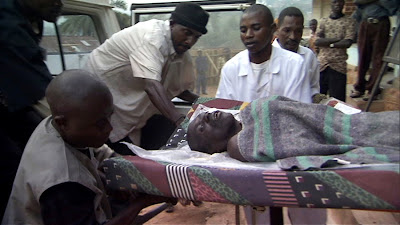
The first thing for most Americans to get used to while watching the award-winning documentary LIVING IN EMERGENCY will be the use of the acronym MSF (Médecins sans Frontières) that is tossed about throughout the film. We know the name of this organization of doctors who supply medical help of every kind in many of the world's worst places -- violent, genocidal, destruction-ridden -- as Doctors Without Borders. Either way, you'll soon get used to the MSF name. Harder to get used to, I'd say near-impossible (for viewers and the participating docs), is what they must observe and then work through and around in their quest to save lives.
Directed by Mark N. Hopkins, shown at left, in a put-you-in-the-middle-of-it-all manner, the documentary slams you into the daily grind (this phrase has rarely taken on such heavy-
duty meaning) of a quartet of doctors, one woman and three men, who respond to their situations and envi-
ronment in very diffe-
rent ways. The success rate of the operations these doctors perform is probably much lower than literally anywhere else they could practice. "This is low-grade medicine," notes one of the docs, "but what can you do? As a young bourgeoisie, you find it very difficult." Really. And yet they do it.
Some of the operations shown -- one amazingly horrible hernia, for instance -- are grueling to view but unlike the torture porn favored by audiences over the last decade, this is real rather than "entertainment" and so will likely be ignored by the great unwashed. One man, above, who has been shot point blank in the face by rebels/terrorists, must be operated on immediately. But what to do? Unsure, the doctor decides to drain his head (or maybe it's his brain? I'm no surgeon) and he lives. But in what state? Later we see him recognize his son and then actually speak. Wonderful! (And probably rare.) But there is little time here for congratulations or worry. Just move on.
As one doctor explains, in normal medical practice, "There are always five, six, seven others with whom to share responsibility. Here there is no one." This single-person as decision-maker/god takes its toll. There is also, the same doc notes later, no limit between what is personal and what is professional here. Later we get a glimpse of just that at a party and see a bout of liberating dancing. "There' a lot of sex on these missions," we're told. "There has to be. Sex is part of life." Though we might hazzard a guess as to the participants, we never really learn more about this.
"We all have the same question: What is our limit?" one MSF worker notes early on. Eventually, we see some of these limits, as the doctors either continue or move elsewhere. "If you put a reasonable person into an unreasonable situation, that person can get crazy." One doc, above, seems to have done a bit of that, and the consequences keep unraveling.
Hopkins' camera is often in-your-face, but with faces this full of sorrow, energy, despair, and determination, the view is usually riveting. Occasionally, and mercifully, the camera moves back to view some beautiful scenery or a dinner table, in a few of the rare, relaxed times.
Living in Emergency may seem like a kind of gritty, dark "infomercial" -- so many documentaries do seem like infomercials these days -- because, once the the filmmaker grow intimate with who his subjects are and what they are doing, this, I think, becomes unavoidable. (Yesterday's post on Bursynski certainly bears this out.) And that's fine. This leaves us looking for the downside, the negatives, elsewhere (surfing the web, reading an article or two) and then judging what we've seen and forming our own conclusions. Meanwhile, we've "lived," as best as a movie can take us, through some very difficult stuff.
That's the case with Living in Emergency. The documentary left me glad I had contributed a bit toward the funding of this organization (its DWB branch, at least). If I ever again manage to make some money off my writing (ain't free content wonder-
ful!), I will hope to give once more.
The documentary begins its run today, Friday, June 4, in New York City at the Landmark Sunshine Cinema, and in Los Angeles, Boston, Berkeley, Philadelphia and Washington DC. Click here for further playdates and cities.








No comments:
Post a Comment